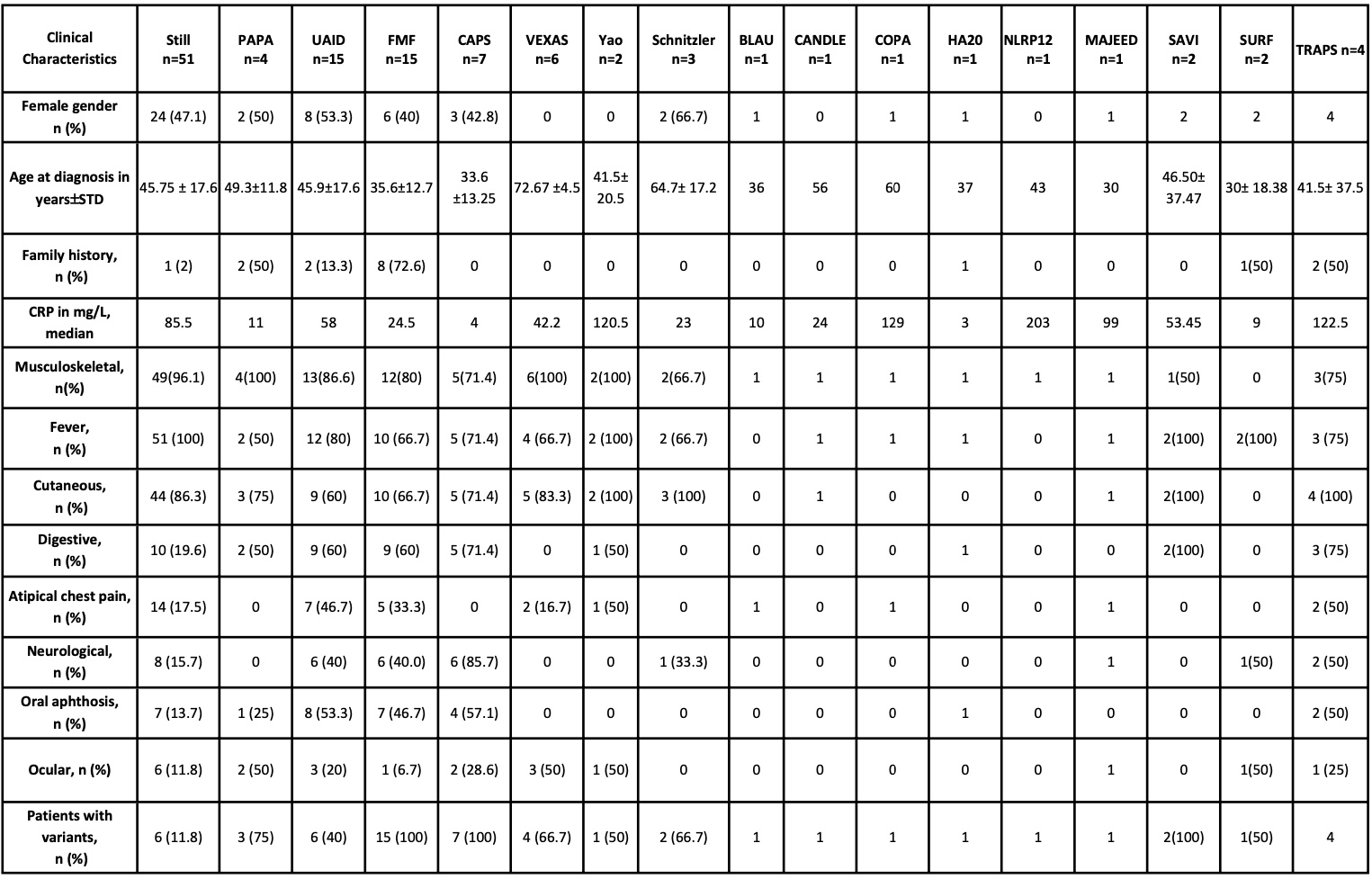Session Information
Date: Sunday, October 26, 2025
Title: (0233–0279) Miscellaneous Rheumatic & Inflammatory Diseases Poster I
Session Type: Poster Session A
Session Time: 10:30AM-12:30PM
Background/Purpose: Autoinflammatory diseases(AIDs) are characterized by recurrent inflammatory episodes resulting from alterations in regulatory genes, activating the innate immune system. Although these diseases primarily occur in children, an increasing number of cases are reported in adults.This study aimed to identify demographic, clinical, analytical, and therapeutic response factors contributing to diagnosing AIDs in adults in a clinical setting. Additionally, we sought to establish a correlation between these variables and the outcomes of genetic analysis.
Methods: A multicenter observational study was conducted involving adult patients (≥16 years) diagnosed with AID and followed up in rheumatology departments in Spain. Demographic, clinical, genetic, analytical, and therapeutic response data were collected. Genetic analysis was performed using Sanger or exome sequencing. Descriptive and relational comparative analyses were conducted using IBM SPSS statistical software.
Results: The study included 117 patients (57 females) with a mean age at diagnosis of 45.3±18.1 years and a mean time to diagnosis of 62 months; 15.4% had a family history of AID.The most frequently diagnosed conditions (table)were adult-onset Still disease(AOSD) (43.6%), undifferentiated AID(UAID)(12.8%), and familial mediterranean fever(FMF)(12.8%).The most common clinical manifestations included musculoskeletal symptoms(88%), fever(83.8%), asthenia(76.1%), cutaneous manifestations(75.2%), constitutional syndrome(40.2%), abdominal pain(30.8%), lymphadenopathy(29.9%), atypical chest pain(29.1%), oral aphthosis(25.6%) and ocular abnormalities(17%). The mean C-reactive protein (CRP) level was 88.1 mg/L.Genetic sequencing was performed for 93 patients(79.3%), with 64.4% of them showing heterozygous findings, including variants of uncertain significance (VUS)(n=35) and pathogenic variants(n=22).Treatment approaches included corticosteroids (GC)(82.1%) with a complete response(CR) of 43.7%, NSAIDs(54.7%) with a CR of 6.2%, methotrexate (MTX)(51.3%) with a CR rate of 31.6%, colchicine(49.6%) with a CR of 15.4%, anakinra(33.3%) with a CR of 38.5%, anti-IL-6(20.4%) with a CR of 58.3%, anti-TNF(19.6%) with a CR of 26.1%, canakinumab(10.2%) with a CR of 58.3%, and JAK inhibitors(6.7%) with a CR of 37.5%.A significant relationship (p< 0.05) was found between carriers of VUS or pathogenic genetic variants and the presence of affected relatives, oral aphtosis, testicle pain, neurological and digestive manifestations. CR to GC and MTX was significantly higher in non-carriers.
Conclusion: This study identified AOSD, UAID and FMF as the most common in adults. Nevertheless, the genetic analysis was not performed in all patients, therefore monogenic AIDs may be underdiagnosed. Musculoskeletal symptoms, fever, asthenia and cutaneous manifestations were prevalent and anti-IL6 and canakinumab treatments showed the highest CR rates.Genetic variants were linked to family history, oral aphtosis, testicle pain, neurological and digestive manifestations while non-carriers had higher CR to GC and MTX. Although the sample size was limited, these findings may assist in detecting monogenic AIDs in adults
 Abbreviations: Autoinflammatory disease (AID), adult-onset Still disease(AOSD), undifferentiated autoinflammatory disease (UAID), familial mediterranean fever(FMF), cryopyrin-associated periodic syndrome(CAPS), syndrome of undifferentiated recurrent fever (SURF), tumor necrosis factor receptor periodic syndrome(TRAPS), STING-associated vasculopathy with onset in infancy (SAVI).
Abbreviations: Autoinflammatory disease (AID), adult-onset Still disease(AOSD), undifferentiated autoinflammatory disease (UAID), familial mediterranean fever(FMF), cryopyrin-associated periodic syndrome(CAPS), syndrome of undifferentiated recurrent fever (SURF), tumor necrosis factor receptor periodic syndrome(TRAPS), STING-associated vasculopathy with onset in infancy (SAVI).
To cite this abstract in AMA style:
Labrador-Sanchez E, Prieto-Peña D, Iñiguez C, Melero-González R, Ruiz-Roman A, Moriano C, García-Escudero P, Brandy A, López M, Anton Pages F, Osorio-SanJuan M, Plaza-Aulestia N, Flores Robles B, Andres Trashaedo E, Blanco R. Autoinflammatory diseases in adult patients. Spanish registry. [abstract]. Arthritis Rheumatol. 2025; 77 (suppl 9). https://acrabstracts.org/abstract/autoinflammatory-diseases-in-adult-patients-spanish-registry/. Accessed .« Back to ACR Convergence 2025
ACR Meeting Abstracts - https://acrabstracts.org/abstract/autoinflammatory-diseases-in-adult-patients-spanish-registry/
